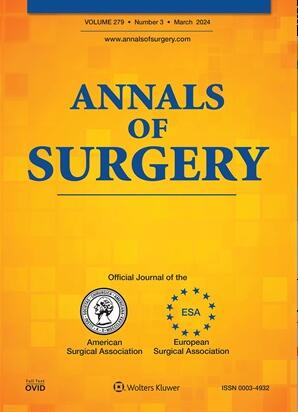Super Learner Enhances Postoperative Complication Prediction in Colorectal Surgery.
IF 6.4
1区 医学
Q1 SURGERY
引用次数: 0
Abstract
OBJECTIVE To determine if a Super Learner (SL) machine learning approach could improve the predictive accuracy of the American College of Surgeons Risk Calculator (ACS-RC) for postoperative complications in patients undergoing colorectal surgery. SUMMARY OF BACKGROUND DATA Machine learning (ML) has shown significant potential to advance medical fields, including surgical risk prediction. Current tools, like the ACS-RC which uses logistic regression and extreme gradient boosting, are standard but may be enhanced by more advanced ML ensembles. METHODS This retrospective study analyzed colorectal surgery cases from the 2018-2022 ACS National Surgical Quality Improvement Program (NSQIP) database. An SL model, which combines multiple ML algorithms, was developed to predict fourteen postoperative outcomes. Its performance was compared against traditional logistic regression (LOG) and extreme gradient boosting (XGB) models. Key performance metrics included discrimination (AUROC, AUPRC) and calibration (Brier score, Hosmer-Lemeshow test). RESULTS The SL model demonstrated superior performance across all predicted complications when compared to both LOG and XGB. It showed superior discrimination for severe outcomes, achieving an AUROC greater than 0.94 for predicting mortality. The SL model was also more accurate in predicting infectious complications and length of stay, and its calibration metrics indicated a better overall fit and accuracy. CONCLUSIONS The Super Learner model enhances the accuracy of postoperative risk prediction in colorectal surgery. Its superior performance suggests it is a promising tool for improving personalized patient counseling, aiding clinical decision-making, and optimizing resource allocation.超级学习者提高结直肠手术术后并发症预测。
目的:确定超级学习者(SL)机器学习方法是否可以提高美国外科医师学会风险计算器(ACS-RC)对结直肠手术患者术后并发症的预测准确性。机器学习(ML)已经显示出巨大的潜力来推进医疗领域,包括手术风险预测。目前的工具,如ACS-RC,使用逻辑回归和极端梯度增强,是标准的,但可以通过更先进的ML集成来增强。方法回顾性分析2018-2022年ACS国家手术质量改进计划(NSQIP)数据库中的结直肠手术病例。结合多种ML算法的SL模型被开发用于预测14种术后结果。将其性能与传统的逻辑回归(LOG)和极限梯度增强(XGB)模型进行了比较。关键绩效指标包括鉴别(AUROC, AUPRC)和校准(Brier评分,Hosmer-Lemeshow测试)。结果与LOG和XGB相比,SL模型在所有预测并发症中表现出优越的性能。它显示出对严重结局的卓越区分,预测死亡率的AUROC大于0.94。SL模型在预测感染并发症和住院时间方面也更准确,其校准指标显示出更好的整体拟合和准确性。结论超级学习者模型提高了结直肠手术术后风险预测的准确性。其优越的性能表明,它是一个有前途的工具,改善个性化的病人咨询,帮助临床决策,优化资源分配。
本文章由计算机程序翻译,如有差异,请以英文原文为准。
求助全文
约1分钟内获得全文
求助全文
来源期刊

Annals of surgery
医学-外科
CiteScore
14.40
自引率
4.40%
发文量
687
审稿时长
4 months
期刊介绍:
The Annals of Surgery is a renowned surgery journal, recognized globally for its extensive scholarly references. It serves as a valuable resource for the international medical community by disseminating knowledge regarding important developments in surgical science and practice. Surgeons regularly turn to the Annals of Surgery to stay updated on innovative practices and techniques. The journal also offers special editorial features such as "Advances in Surgical Technique," offering timely coverage of ongoing clinical issues. Additionally, the journal publishes monthly review articles that address the latest concerns in surgical practice.
 求助内容:
求助内容: 应助结果提醒方式:
应助结果提醒方式:


